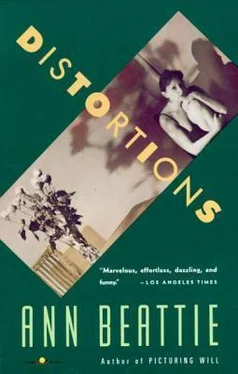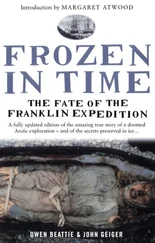Ann Beattie - Distortions
Здесь есть возможность читать онлайн «Ann Beattie - Distortions» весь текст электронной книги совершенно бесплатно (целиком полную версию без сокращений). В некоторых случаях можно слушать аудио, скачать через торрент в формате fb2 и присутствует краткое содержание. Год выпуска: 1991, Издательство: Vintage, Жанр: Современная проза, на английском языке. Описание произведения, (предисловие) а так же отзывы посетителей доступны на портале библиотеки ЛибКат.
- Название:Distortions
- Автор:
- Издательство:Vintage
- Жанр:
- Год:1991
- ISBN:нет данных
- Рейтинг книги:5 / 5. Голосов: 1
-
Избранное:Добавить в избранное
- Отзывы:
-
Ваша оценка:
- 100
- 1
- 2
- 3
- 4
- 5
Distortions: краткое содержание, описание и аннотация
Предлагаем к чтению аннотацию, описание, краткое содержание или предисловие (зависит от того, что написал сам автор книги «Distortions»). Если вы не нашли необходимую информацию о книге — напишите в комментариях, мы постараемся отыскать её.
Distortions — читать онлайн бесплатно полную книгу (весь текст) целиком
Ниже представлен текст книги, разбитый по страницам. Система сохранения места последней прочитанной страницы, позволяет с удобством читать онлайн бесплатно книгу «Distortions», без необходимости каждый раз заново искать на чём Вы остановились. Поставьте закладку, и сможете в любой момент перейти на страницу, на которой закончили чтение.
Интервал:
Закладка:
Michael calls his wife — a mistake. Mary Anne is having trouble in the day-care center. The child wants to quit and stay home and watch television. Since Michael isn’t doing anything, his wife says, maybe he could stay home while she works and let Mary Anne have her way, since her maladjustment is obviously caused by Michael’s walking out on them when he knew the child adored him.
“You just want me to move back,” Michael says. “You still like me.”
“I don’t like you at all. I never make any attempt to get in touch with you, but if you call you’ll have to hear what I have to say.”
“I just called to say hello, and you started in.”
“Well, what did you call for, Michael?”
“I was lonesome.”
“I see. You walk out on your wife and daughter, then call because you’re lonesome.”
“Silas ran away.”
“I certainly hope he comes back, since he means so much to you.”
“He does,” Michael says. “I really love that dog.”
“What about Mary Anne?”
“I don’t know. I’d like to care, but what you just said didn’t make any impression on me.”
“Are you in some sensitivity group, or something?”
“No.”
“Well, before you hang up, could you think about the situation for a minute and advise me about how to handle it? If I leave her at the day-care center, she has a fit and I have to leave work and get her.”
“If I had a car I could go get her.”
“That isn’t very practical, is it? You don’t have a car.”
“You wouldn’t have one if your father hadn’t given it to you.”
“That seems a bit off the subject.”
“I wouldn’t drive a car if I had one. I’m through with machines.”
“Michael, I guess I really don’t feel like talking to you tonight.”
“One thing you could do would be to give her calcium. It’s a natural tranquilizer.”
“O.K. Thanks very much for the advice. I hope it didn’t tax you too much.”
“You’re very sarcastic to me. How do you expect me to be understanding when all I get is sarcasm?”
“I don’t really expect it.”
“You punch words when you talk.”
“Are you stoned, Michael?”
“No, I’m just lonesome. Just sitting around.”
“Where are you living?”
“In a house.”
“How can you afford that? Your grandmother?”
“I don’t want to talk about how I live. Can we change the subject?”
“Can we hang up instead, Michael?”
“Sure,” Michael says. “Good-night, baby.”
Sam and Carlos are visiting Michael. Carlos’s father owns a plastics plant in Bridgeport. Carlos can roll a joint in fifteen seconds, which is admirable to Michael’s way of thinking. But Carlos can be a drag, too. Right now he is talking to Michael about a job Michael could have in his father’s plant.
“No more factories, Carlos,” Michael says. “If everybody stopped working, the machines would stop, too.”
“I don’t see what’s so bad about it,” Carlos says. “You work the machines for a few hours, then you leave with your money.”
“If I ask my grandmother for money she sends it.”
“But will she keep sending money?” Sam asks.
“You think I’m going to ask her?”
“I’ll bet you wouldn’t mind working someplace in the South, where the women look like Tammy Wynette.”
“North, South — what’s the difference?”
“What do you mean, ‘What’s the difference?’ Women in the South must look something like Tammy Wynette, and women up North look like mill rats.”
Carlos always has very powerful grass, which Michael enjoys. Carlos claims that he puts a spell on the grass to make it stronger.
“Why don’t you put a curse on your father’s machines?” Michael says now.
“What for?” Carlos asks.
“Why don’t you change all the machines into Tammy Wynettes?” Sam asks. “Everybody would wake up in the morning and there would be a hundred Tammy Wynettes.”
Sam realizes that he has smoked too much. The next step, he thinks now, is to stop smoking.
“What do you do?” Carlos asks Sam.
“I sell shoes.” Sam notices that he has answered very sanely. “Before that, I was a math major at Antioch.”
“Put a curse on that factory, Carlos,” Michael says.
Carlos sighs. Everybody smokes his grass and pays no attention to what he says and then they want him to put curses on things all the time.
“What if I put a curse on you?” Carlos asks.
“I’m already cursed,” Michael says. “That’s what my grandmother says in her letters — that I was such a blessing to the family, but I myself am cursed with ill luck.”
“Change me into George Jones,” Sam says.
Carlos stares at them as he rolls a joint. He isn’t putting a curse on them, but he is considering it. He firmly believes that he is responsible for his godfather’s getting intestinal cancer. But he isn’t really a magician. He would like his curses to be reliable and perfect, like a machine.
Michael’s grandmother has sent him a present — five pounds of shelled pecans. A booklet included with the package says that they are “Burstin’ with wholesome Southern goodness.” They’re the first thing he has eaten for a day and a half, so he eats a lot of them. He thinks that he is eating in too much of a hurry, and he smokes some hash to calm down. Then he eats some more pecans. He listens to Albinoni. He picks out a seed from a pouch of grass that is lying under the couch and buries it in one of Prudence’s plants. He will have to remember to have Carlos say a few words over it; Carlos is just humble when he says he can’t bless things. He rummages through the grass and finds another seed, plants it in another pot. They’ll never grow, he thinks sadly. Albinoni always depresses him. He turns the record off and then is depressed that there is no music playing. He looks over the records, trying to decide. It is hard to decide. He lights his pipe again. Finally, he decides — not on a record but what to eat: Chunky Pecans. He has no Chunky Pecans, but he can just walk down the road to the store and buy some. He counts his change: eighty cents, including the dime he found in Prudence’s underwear drawer. He can buy five Chunky Pecans for that. He feels better when he realizes he can have the Chunky Pecans and he relaxes, lighting his pipe. All his clothes are dirty, so he has begun wearing things that Richard left behind. Today he has on a black shirt that is too tight for him, with a rhinestone-studded peacock on the front. He looks at his sparkling chest and dozes off. When he awakens, he decides to go look for Silas. He sprays deodorant under his arms without taking off the shirt and walks outside, carrying his pipe. A big mistake. If the police stopped to question him and found him with that … He goes back to the house, puts the pipe on a table, and goes out again. Thinking about Silas being lost makes him very sad. He knows it’s not a good idea to go marching around town in a peacock shirt weeping, but he can’t help it. He sees an old lady walking her dog.
“Hello, little dog,” he says, stopping to stroke it.
“It’s female,” the old woman says. The old woman has on an incredible amount of makeup; her eyes are circled with blue-bright blue under the eyes, as well as on top.
“Hello, girl,” he says, stroking the dog. “She’s thirteen,” the old woman says. “The vet says she won’t live to see fourteen.”
Michael thinks of Silas, who is four.
“He’s right, I know,” the old woman says.
Michael walks back around the corner and sees Silas on the front lawn. Silas charges him, jumps all over him, barking and running in circles. “Where have you been?” Michael asks the dog. Silas barks. “Hello, Silas. Where have you been?” Michael asks. Silas squirms on his back, panting. When Michael stoops to pat him, Silas lunges, pawing the rhinestone-studded shirt and breaking the threads. Rhinestones fall all over the lawn.
Читать дальшеИнтервал:
Закладка:
Похожие книги на «Distortions»
Представляем Вашему вниманию похожие книги на «Distortions» списком для выбора. Мы отобрали схожую по названию и смыслу литературу в надежде предоставить читателям больше вариантов отыскать новые, интересные, ещё непрочитанные произведения.
Обсуждение, отзывы о книге «Distortions» и просто собственные мнения читателей. Оставьте ваши комментарии, напишите, что Вы думаете о произведении, его смысле или главных героях. Укажите что конкретно понравилось, а что нет, и почему Вы так считаете.












